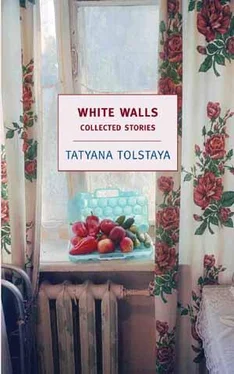So once again evening falls, and from the woods comes that vile Korobeinikov, carrying his foul toadstool. Everyone already knows about his treachery, about the mark of Cain on him. Olga Mikhailovna stands on the porch. “You have to forgive him,” said Dmitry Ilich, but she doesn’t want to forgive him. “Judge not, that ye be not judged,” said Dmitry Ilich. All right, so she’ll be judged, but at least she’ll have the satisfaction of making judgments herself. She loves truth, what can you do, that’s how she is. Of course, she’s not about to persecute Korobeinikov—he has an ulcer, after all—but inside, in the pure house of her soul, she has the right to keep things in their proper place. And the place for trash is the kitchen, not the parlor.
There he sits, in the wicker chair, weaving a lot of nonsense about miracles. There he goes, slurping tea and chomping on cake. There he goes, singing like a nightingale about how some kind of mysterious voids were supposedly found deep inside the pyramid of Cheops, and what could this signify? You’re the pyramid of Cheops yourself, thinks Olga Mikhailovna. “Megahertz…” mutters Olga Mikhailovna’s husband. And everyone else thinks hostile thoughts. And Korobeinikov can’t help but feel this.
Korobeinikov is confused; Korobeinikov mumbles on—about how one fine evening, see, the skies over Petrozavodsk convulsed and a heavenly flame descended, a column of horrendous force, and everything turned bright as day, while crimson stripes ranged the sky and the whole shebang flashed and quaked, and what could this possibly signify? But knowing what they now know about Korobeinikov, the hosts and their guests no longer ooh and ah, no longer laugh, no longer cry out in disbelief. Olga Mikhailovna forces a smile, even though it’s about as easy for her to smile as it would be to lift weights, and she curses herself for her fake smile, her female cowardice: if only she could somehow give Korobeinikov to understand that that’s it—that’s it!—he needn’t come around here again, that’s enough, we don’t want him anymore. We know about your low-down dirty trick. And your ulcer is no excuse! Your ulcer is a heavenly flame sent down on you as a punishment, that’s what! We wish you no ill—go and get yourself cured, take your little vitamin pills, go drink buttermilk in your sanatorium—but don’t come around here! And don’t bring us any mushrooms.
Korobeinikov, of course, can feel that the temperature at the dacha has dropped for some reason. He’s nervous; he smokes one cigarette after another; behind the thick lenses of his glasses his eyes watch, frightened and uneasy; he thinks the problem must be his stories—maybe he’s repeating himself, maybe they aren’t interested in this stuff. He hastens to inform them about the Filipino healers—it doesn’t help; he remembers a marvelous story about the Berdichev bonesetter who puts hopeless paralytics back on their feet—useless; the ice stays ice; they stare at him, their eyes hard as nuts. Finally he gets up to leave, and they all nod, but it’s not quite the same; they offer him the jacket again, but they don’t even pretend to rise, don’t walk him out to the porch, don’t see him off—it’s as though their joints had turned to stone. True, Olga Mikhailovna can’t help but do her duty as hostess: she opens the front door, waits for him to descend from the porch, turn on his flashlight, and disappear deep into the birch grove. The beam floats steadily, thoughtfully, through the severe, white tree trunks; it doesn’t soar or circle, doesn’t dance in the darkness.
Korobeinikov’s ashtray is full of butts—geez, look how much he smoked! Everyone stares after the ashtray meaningfully as Olga Mikhailovna’s husband goes to dump it—that mound of empty, stinking cardboard tips—as if it measured the guilt of an unclean man.
Korobeinikov walks through the unsheltering grove. The birch trunks are chilly, and the ground feels cold through his shoes; ahead smolder the lights of the sanatorium, a vale of woe: the beds there are white and the bed tables are white, the walls shine with white oil paint, white lamps hang from the ceilings, and on the staircase landing, where Korobeinikov goes to smoke, a fire hose is curled up in a white cabinet with glass doors. The hose is brown, flat, long—infinitely long, longer than life—and at night, when Korobeinikov falls asleep, headless orderlies will sail into the ward without touching the floor and order Korobeinikov to swallow the hose—that’s what you have to do before an operation—and, choking, he will swallow, swallow those long, endless yards of dull, rough ribbon.
The next day, Korobeinikov sits at his boring meal, listlessly pokes at his fish balls with a fork, stares out the wide sanatorium windows to where August burns with gold, green, and deep blue—he’ll go for his usual walk and then he’ll drop by that house after all: he was only imagining things, he must have been in a bad mood himself, it’s just the illness, it’s the pain, the rumble, the spoonful of fire he must have swallowed somehow by mistake, those people have nothing to do with it. He walks through the grove, touches the cold bushes, leans his spectacles earthward, looking for a mushroom, but there aren’t any; lots of people hunt for them here.
He sits on the veranda, trying to joke and be entertaining, but Olga Mikhailovna only narrows her eyes, and Olga Mikhailovna’s husband, who whenever he hears a good joke repeats it again and again, asks, “So how’s your megahertz—still hurts?” although the question is really unnecessary. And the conversation flags, halts, dries up, as if everything on earth had already been said.
It must be boring for them to listen to the same thing over and over again—why hadn’t he considered that? Now, when that yellow-eyed sculptor puts on a show, they’re all pleased as Punch, they all laugh. Still, an old friend is better than two new ones, Korobeinikov thinks vaguely to himself; no matter, he’ll just have to outtalk him. He’ll prepare something for tomorrow. About life after death, for instance. What a person sees when he faints or is in a coma, when he’s clinically dead. Oh, there’s a lot of gripping stuff! The witnesses are completely reliable. He actually talked to one of these people. This guy told him that on the other side, everything is sky blue and transparent, but there’s no air, and you don’t need to breathe, you don’t even miss it. And, you know, the feeling is like when you’re young, or you just got out of the army, or you just had a son— a really good feeling. And then someone appears—you can’t exactly see anyone, but he’s there all the same—and this someone talks to you, but without any voice. “It’s not time yet,” he says. In a kind of respectful way. And then, whoosh!—you’re suddenly back on the operating table again, everybody’s running around you, frantic, but you’re lying there and you’re thinking, What do any of you know!… Yes, that’s a good story. Only it has to be told with elan, with spirit. Have to rouse the audience, right?… No, I won’t go there anymore, thinks Korobeinikov, heading back, tripping over a root. It’s humiliating, for heaven’s sake! If only it weren’t for the whiteness of the hospital, the dull shine of the linoleum, the sterile, deathly cigarette bucket! If only the fire hose didn’t come sneaking up in the evenings, didn’t stick to you with suction cups, didn’t sting you to the very core.
Completely yellow, Korobeinikov walks along the evening path. Dmitry Ilich embraces Olga Mikhailovna in the birch forest.
“Why does he keep dragging himself over here?” says Olga Mikhailovna indignantly, her eyes following the gaunt figure.
“Oh, don’t pay him any mind, little one,” says Dmitry Ilich, kissing her.
Читать дальше












